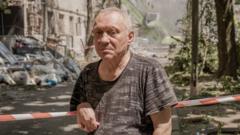Ahmed al-Shara, once a rebel leader, is now President of Syria following the fall of Bashar al-Assad. In recent talks, he outlined the hurdles his administration will face, from foreign alliances to the recovery of a war-torn nation.
Syria's New Leadership: Challenges and Opportunities Ahead

Syria's New Leadership: Challenges and Opportunities Ahead
In a pivotal moment for Syria, newly elected President Ahmed al-Shara discusses the future of the country post-civil war, including military alliances and challenges ahead.
In a historic shift for Syria, Ahmed al-Shara has emerged as the new leader of the country after the fall of long-time President Bashar al-Assad, who was ousted by a coalition including al-Shara's group, Hayat Tahrir al-Sham. This transition marks a significant moment for a nation ravaged by years of civil war, and al-Shara now finds himself the head of a government tasked with profound challenges.
In a recent interview with The New York Times, al-Shara outlined his administration's aims and the labyrinth of geopolitical dynamics he must navigate, including discussions surrounding military aid from Russia and Turkey. He is keen to lift sanctions hindering Syria's recovery and indicated that foreign fighters who support his government could be offered Syrian citizenship, a move which could drastically reshape the nation’s societal fabric.
Al-Shara’s new role comes with the daunting responsibility of overseeing reconstruction efforts in a country decimated by war. He faces the dual task of reassuring skeptical Western nations of his government’s legitimacy while managing delicate relationships with regional powers like Turkey and Israel. Furthermore, he must establish a new rapport with Russia, a former ally of Assad’s regime, as the geopolitical landscape in the Middle East continues to evolve.
As al-Shara begins to forge a path for Syria's future, he will need to balance the expectations of the international community against the realities on the ground. The decisions made in this transitional period will be pivotal in shaping not only the future of Syria but also its standing in a complex regional and global political environment.




















